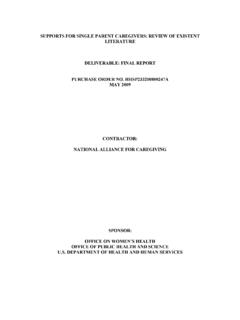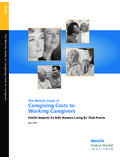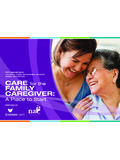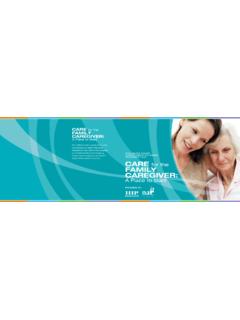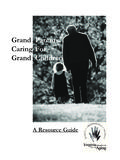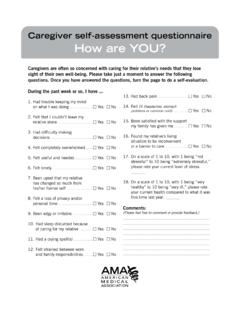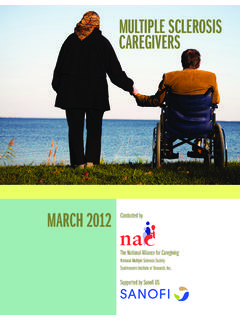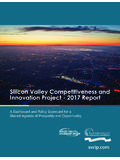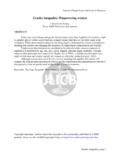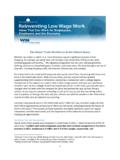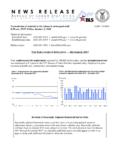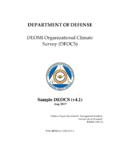Transcription of Evercare Study of Hispanic Family Caregiving in the …
1 Findings From a National StudyNovember 2008 EvercareandNational Alliance for CaregivingHispanic Family Caregiving in the Study ofEvercare Study of Hispanic Family Caregiving in the From a National StudyNovember 2008 Evercare in collaboration with National Alliance for CaregivingStudy PublishersEvercareEvercare is one of the nation s largest health care coordination programs for people who have long-term or advanced illness, are older or have disabilities. Founded in 1987, Evercare today serves more than 350,000 people nationwide through Medicare, Medicaid and private-pay health plans, programs and services from health plans for people in community and skilled nursing settings, to caregiver support and hospice care.
2 Evercare offerings are designed to enhance health and independence, and in the complex world of health care, making getting care is part of Ovations, a division of UnitedHealth Group (NYSE: UNH) dedicated to the health care needs of Americans over age 9701 Data Park Drive Minnetonka, MN 55343 Alliance for CaregivingEstablished in 1996, the National Alliance for Caregiving is a non-profit coalition of more than 40 national organizations that focus on issues of Family Caregiving across the life span. The Alliance was created to conduct research, do policy analysis, develop national programs and increase public awareness of Family Caregiving issues. It also works to strengthen state and local Caregiving coalitions and work on international Caregiving alliances.
3 Recognizing that Family caregivers make important societal and financial contributions toward maintaining the well-being of those for whom they care, the Alliance s mission is to be the objective national resource on Family Caregiving , with the goal of improving the quality of life for families and care Alliance for Caregiving 4720 Montgomery Lane, Suite 205 Bethesda, MD 20814 and the National Alliance for Caregiving (NAC) have collaborated on three national Caregiving studies which put into sharper focus one of our society s most undervalued groups: Family Study of Caregivers in Decline (2006) about the health risks caregivers faceEvercare Study of Family Caregivers: What They Spend, What They Sacrifice (2007) highlighting the out-of-pocket costs of caring for an older loved oneEvercare Study of Hispanic Family Caregiving in the (2008) the first-ever in-depth look at Hispanic caregivers 2008 NAC and Evercare Reprinting with permissionAcknowledgmentsThe National Alliance for Caregiving and Evercare by UnitedHealthcare are proud to present this first nationwide comprehensive Study of Hispanic Family caregivers in the Gail Gibson Hunt of the National Alliance for Caregiving and Sherri Snelling of Evercare set the direction for this Study .
4 In addition, they wish to acknowledge two experts who provided input to the questionnaire and its translation:Maria Aranda, and LCSW, University of Southern California Martha Pelaez, International Consultant on Aging and HealthThe research was conducted by Mathew Greenwald & Associates, with Linda Naiditch managing the Study . Table of ContentsForeword ..1 Yanira Cruz National Hispanic Council on Aging ..3 Introduction ..5 Josefina G. Carbonell Administration on Aging ..7 Background ..9 Purpose of Study ..11 Summary of Methodology ..11 Summary of Key Findings ..11 Policy Implications ..12 Methodology ..15 Quantitative Telephone Interview Study ..17 Focus Groups ..18 Limitations ..18 Reading This Report.
5 18 Key Findings ..21 Prevalence of Caregiving Among Hispanic Households ..23 Detailed Findings ..29 Prevalence of Caregiving in Hispanic Households ..31 Basics of the Caregiving Situation ..31 Caregiving Activities and Burden of Care ..35 Presence of Other Caregivers ..41 Care Recipient Living Situation ..45 Care Recipient s and Balance in Caregiver s Life ..49 Attitudes and Beliefs About Nursing Care and Health Workers ..54 Beliefs and Feelings About Caregiving ..57 Caregiving Challenges and Sources of Information and Services ..59 Importance of Spanish Language Information and Services ..65 Helpful Training and Services ..67 Respondent Profile ..69 Appendix A ..75 Table of FiguresFigure 1: Current vs.
6 Past Care ..31 Figure 2: Number of Care Recipients ..32 Figure 3: Gender of Caregiver and Care Recipient ..32 Figure 4: Age of Care Recipient ..33 Figure 5: Age of Caregiver ..33 Figure 6: Care Recipient Relation to Caregiver ..34 Figure 7: Choice in Taking on Caregiver Role ..34 Figure 8: Hours of Care Provided ..35 Figure 9: Help With Activities of Daily Living (ADLs) ..35 Figure 10: Help With Instrumental Activities of Daily Living (IADLs) ..36 Figure 11: Level of Burden Index ..38 Figure 12: Stress of Caregiving ..39 Figure 13: Caregiver Health ..40 Figure 14: Primary Caregiver Status ..41 Figure 15: Presence of Other Unpaid Caregivers ..42 Figure 16: Whether Other Unpaid Caregivers Do Their Fair Share.
7 43 Figure 17: Ease of Finding a Back-up Caregiver ..43 Figure 18: Use of Paid Services ..44 Figure 19: Where Care Recipient Lives ..45 Figure 20: Caregiver Distance From Care Recipient ..46 Figure 21: Care Recipient s Main Problem or Illness ..47 Figure 22: Presence of Alzheimer s or Mental Confusion ..48 Figure 23: Caregiver Employment Status ..49 Figure 24: Work Accommodations Due to Caregiving ..50 Figure 25: Satisfaction With Balance Between Work and 26: Paid Caregiver Status ..51 Figure 27: Satisfaction With Social Life ..52 Figure 28: Overlap of Social Life With Caregiving Time ..52 Figure 29: Satisfaction With Family Relationships ..53 Figure 30: Decision-Maker Status for Decisions About Nursing Homes/Assisted Living.
8 54 Figure 31: Consideration of Nursing Home/Assisted Living Placement ..55 Figure 32: Beliefs About Health Workers ..56 Figure 33: Cultural Perspectives on 34: Caregivers Personal Perspective on Caregiving ..57 Figure 35: Caregiving Impacts and Religious Support ..58 Figure 36: Caregiving Challenges and Difficulties ..59 Figure 37: Search for Information/Services To Help With Caregiving Challenges ..60 Figure 38: Sources of Information/Services Used To Help With Caregiving Challenges ..61 Figure 39: Internet Usage ..62 Figure 40: Success in Finding Information To Help With Caregiving Challenge ..63 Figure 41: Reasons for Not Looking for Information/Services Regarding Caregiving Challenge.
9 63 Figure 42: Importance of/Satisfaction With Spanish Language Caregiving Information ..65 Figure 43: Importance of Delivering Caregiving Services in 44: Helpfulness of Training and Services ..67 Foreword3 ForewordThe Family has always been at the heart of the Hispanic community. Caring for our elders is considered an honor and a role we perform willingly. Over the last three decades as life expectancies have grown, some say we are at the forefront of a longevity revolution. Living longer is a gift but with it comes concerns not just about health, such as chronic illnesses like diabetes and heart disease, but also about rising health care costs. Many of these issues have Hispanic families turning to each other even more for physical, emotional and financial Study conducted by the National Alliance for Caregiving (NAC) and Evercare by UnitedHealthcare is significant in that it is the first-ever in-depth look at the Hispanic community and its Family caregivers.
10 Understanding the special situations, the language and cultural needs, and the programs and solutions available to Hispanic families is important as we all face this longevity revolution over 25 years, the National Hispanic Council on Aging (NHCOA) has recognized that the health and well-being of our padres y abuelitos is directly related to the care and nurturing from their families and communities. Our goal is to share the best of us so that our elders can enjoy their golden years in health and security surrounded by Family and we know diabetes continues to be one of the most serious health care burdens impacting hispanics afflicting twice as many hispanics as non- hispanics in the , especially Hispanic older adults, this Study by NAC and Evercare now uncovers that Hispanic Family caregivers on a ratio of two to one are saying they are providing more care for their elder due to diabetes.


